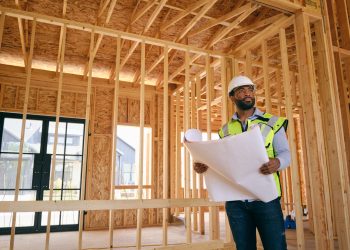 Instead of starting with a bang, 2016 kicked off with a plunge. On the first day of trading, Jan. 4, the American indexes recorded the biggest losses ever for a year-opening session. The Dow Jones Industrial Average dropped 275 points, with the S&P 500 and NASDAQ indexes each shedding 1.5 percent and 2.1 percent, respectively.
Instead of starting with a bang, 2016 kicked off with a plunge. On the first day of trading, Jan. 4, the American indexes recorded the biggest losses ever for a year-opening session. The Dow Jones Industrial Average dropped 275 points, with the S&P 500 and NASDAQ indexes each shedding 1.5 percent and 2.1 percent, respectively.
From there, the stock market only got worse for average investors. Fueled by even sharper declines overseas and a Federal Reserve (the Fed) policy that could continue to raise interest rates, the first quarter of the year is shaping up to be extremely volatile and sometimes scary to watch. But what does it all mean for real estate?
For most of the country, it could actually be good. As stocks become a riskier asset class by comparison, real estate could be seen as a safe haven or, at the very least, a more stable place for homebuyers and investors to put their money.
“For the more normal price ranges, more clients are turning to real estate for stability and to guard against inflation,” says Randy Courtney, broker/owner of Courtney Valleywide Properties in Arizona.
Courtney began to notice a change in buyer behavior around the time when the Chinese stock market collapsed in mid-2015. That market, which represents the world’s second-largest economy, suffered a crash of epic proportions and lost nearly half of its market cap in about a month. It was a staggering blow for the Chinese, who are relatively new to the stock-picking culture and have been increasingly active in buying American properties. Their loss rippled through the global economy but never impacted the core U.S. indicators, such as employment, inflation and gross domestic product.
Still, with the domestic markets softened by China, the Fed’s December announcement to raise the prime interest rate by a quarter of a percentage point seems to have triggered an accelerated volatility that real estate brokers are scrambling to understand so they can best advise their panicked clients.
“I think the volatility affects more of the upper-end buyers,” says Courtney, adding that Arizona homes listed for more than $2 million are more vulnerable to this trend. “The world economy seems to be uneasy since about July 2015. Luxury homes were selling well for the first three quarters in Phoenix, then with China and the stock market gyrating, sales have been very soft.”
In the posh Hamptons communities of New York, a luxurious destination for Manhattanites, the volatility has sparked a mix of unease and opportunity.
“This is a curious market right now with the stock market looking unsettled,” says Diane Saatchi of Saunders & Associates, a broker who buys and sells all over the Hamptons region. “You’d think the vacation home market is less impacted by the stock market, but it’s actually worse. People aren’t on a schedule when they buy second or third homes.”
After years of recovering real estate prices and increasing activity, the recent volatility has softened the market for luxury homebuyers. Saatchi says these buyers are very savvy and can afford to wait for the right conditions before pulling the trigger on a deal.
“Buyers think they can rent for another year,” she explains. “It’s a luxury lifestyle—not a tragedy to be second-homeless or third-homeless.”
Meanwhile, in New York City, where much of the Hamptons crowd keeps their primary residences, there is a big segment of the real estate pool that is directly impacted by Wall Street. Unlike single-family homebuyers in the Midwest, a regular homebuyer in Manhattan is likely to work in the financial services industry and could be afraid of losing his or her job in a bear market.
“I’ve noticed a pull-back in the upper markets,” says New York City broker Klara Madlin of Klara Madlin Real Estate. “A lot of people are very nervous to do anything.”
In the upscale neighborhoods of the Upper West Side and Upper East Side, Madlin thinks buyers will wait and see how the stock market looks in the second half of 2016 before deciding to re-enter the real estate market.
Manhattan is also very influenced by international buyers, and that demand has slowed down, as well. The recent stock market crash in China has blocked some would-be buyers, and a longer-term economic slowdown in Russia is starting to take its toll on what has been an enormous rush of buying pressure on the Manhattan market. Plus, much of the demand has been offset by billions of dollars worth of new, high-end construction in the city, which has transformed the iconic Manhattan skyline.
With such headwinds converging, Madlin says brokers are being extra sensitive to stocks. When housing collapsed nationwide in the late 2000s, it was closely tied to a stock market crash and the implosion of the banking industry. Today’s situation doesn’t seem nearly as dire, but the memories of Lehman Brothers and Bear Stearns are still very fresh in the minds of the Big Apple’s real estate brokers.
“I haven’t seen a big effect of people being laid off in the financial sector like we did a few years ago, but people are being more cautious. They are going to see where they are with their portfolio and their jobs,” Madlin reports. “A year ago, it was more bullish. There were bidding wars. Now there are some bidding wars, but it’s more down to earth.”
Whether clients are being motivated by fear, caution or opportunity, brokers are feeling a lot of pressure to set expectations, and that can be hard news to break.
“I think I make people cry when I set expectations. Sellers need to be told that this might not be another up year due to the stock market correction and economic uncertainty,” says Saatchi. “These kinds of fluctuations make us busy. It makes our lives a little more complicated.”
Andrew King is an award-winning journalist with 15 years of experience with the Gannett newspaper company, appearing in The Journal News (Westchester, N.Y.), Asbury Park Press and USA Today. He also contributes to The Real Deal, TheLadders.com and TechPageOne.com.










